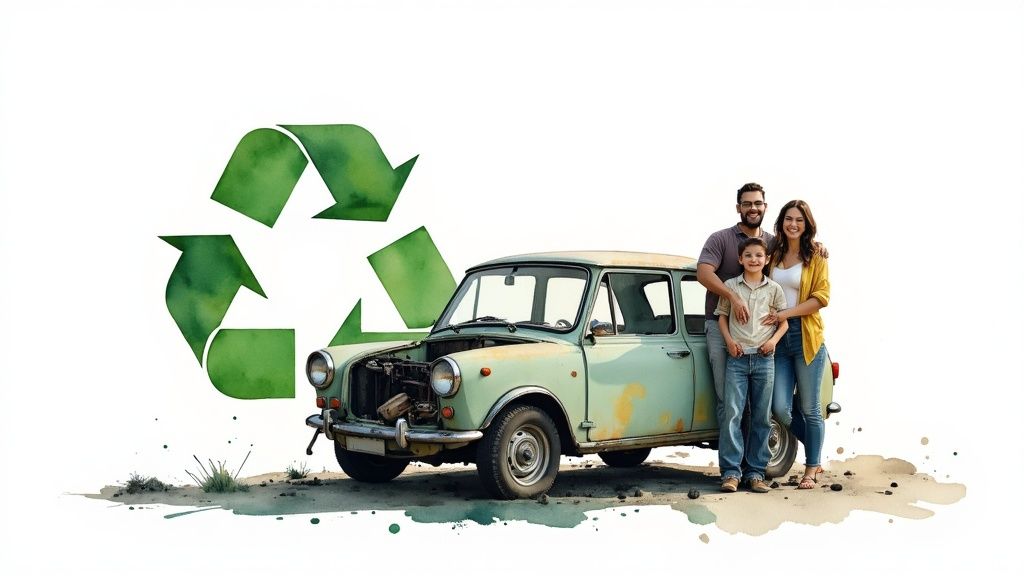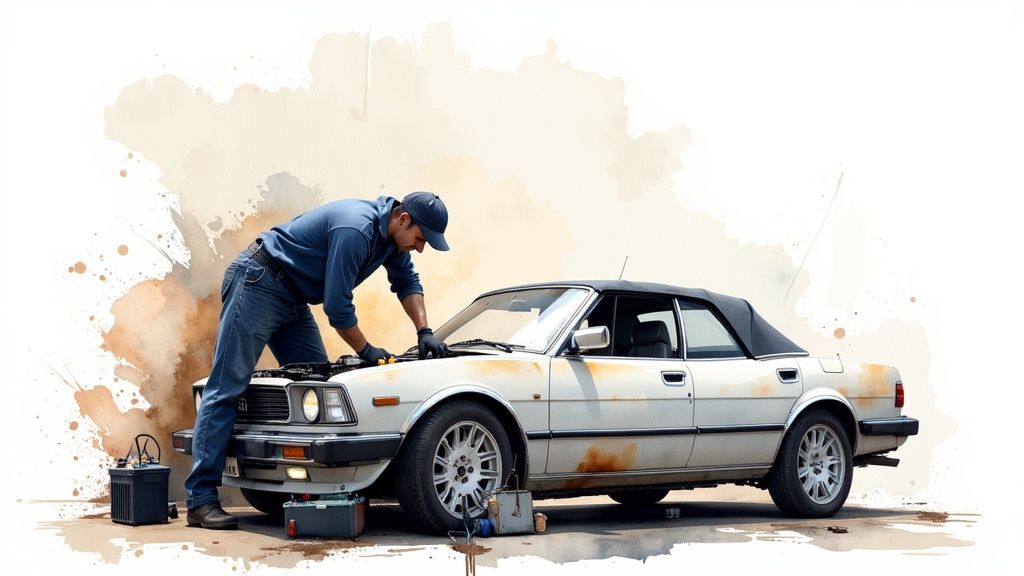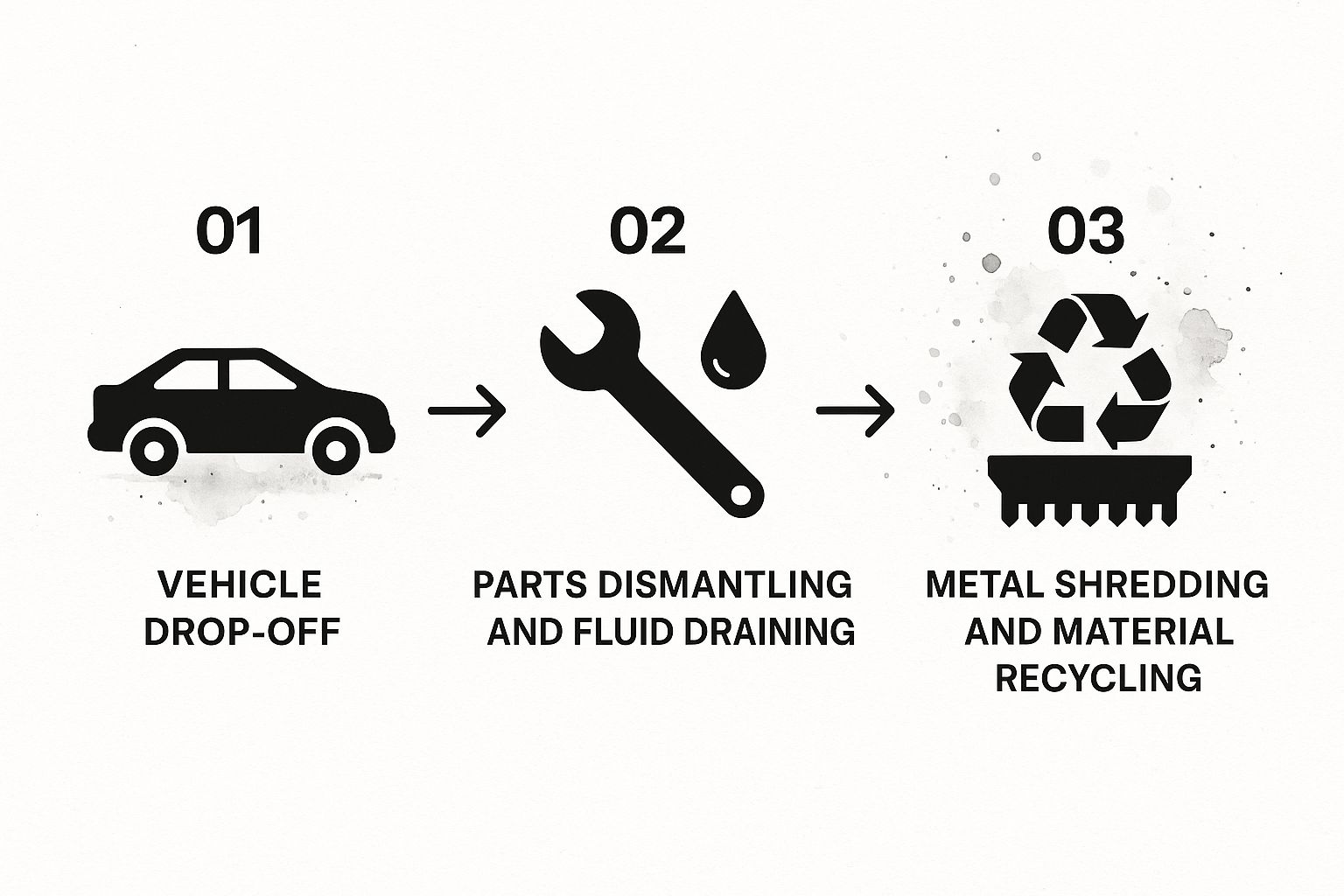
Recycle My Car for Cash A UK Guide
When you think, "it's time to recycle my car," the image that probably springs to mind is a muddy, disorganised scrapyard from a gangster film. The reality couldn't be more different. Today's car recycling industry is a clean, highly regulated world of Authorised Treatment Facilities (ATFs) that expertly turn your old car back into valuable raw materials.
Why Modern Car Recycling Is a Smart Move

Deciding to recycle your car isn't just about clearing space on your driveway. It’s a genuinely smart financial move and a huge win for the environment. Forget any old myths you've heard about dodgy dealings or rust heaps polluting the countryside. The official process is now buttoned up tight to protect you legally, get every last bit of reusable material out of the vehicle, and make sure you're paid properly for what it's worth.
The Environmental and Economic Impact
When you send your car to a certified ATF, you're plugging directly into the circular economy. This isn't just a buzzword; it means stopping hazardous stuff like engine oil and battery acid from poisoning the ground and recovering tonnes of valuable metal.
And this is a big deal. The UK's vehicle recycling market was valued at around USD 2.0 billion in 2024, and it's on track to hit nearly USD 3.1 billion by 2033. That growth is fuelled by strict UK End-of-Life Vehicle (ELV) regulations. These rules force facilities to safely handle all the nasty fluids and recover materials like steel and aluminium, which often go straight back into making new, more efficient cars. If you're interested in the numbers, you can explore more data on the UK vehicle recycling market to see the full scale of the operation.
The modern recycling process is incredibly efficient, ensuring that up to 95% of a vehicle's materials are recovered and put back to use. We're not just talking about the metal shell; this includes plastics, glass, and even the fluids, transforming your old car from a problem into a resource.
Benefits of Professional Car Recycling
Using a professional service like Fast Scrap Car gives you a massive advantage over trying to sell privately or, worse, using some unlicensed "cash for cars" outfit. The difference is night and day.
Here’s what you get with a professional service:
- Total Legal Cover: You’ll receive a Certificate of Destruction (CoD). This is the crucial document that officially proves you are no longer the registered keeper, protecting you from any future fines or legal headaches connected to the vehicle.
- Guaranteed Payment: Reputable companies give you a fair, competitive quote based on your car's real scrap value. Payment is always made securely by bank transfer because paying cash for scrap metal has been illegal for years.
- True Environmental Responsibility: ATFs have the proper equipment to de-pollute a vehicle before it's crushed. They drain all the oils, fuel, coolant, and other hazardous liquids, ensuring they’re disposed of safely.
By choosing the professional route, you're making sure the whole process is handled properly from start to finish—legally, efficiently, and with the best possible outcome for the planet. Now, let's get into the simple steps to get it done.
How to Get the Best Price for Your Old Car

Getting a fair price for your old car starts with understanding what it's actually worth to a recycling facility. It’s a common misconception that the value is just based on its weight in metal. In reality, a whole host of factors come into play, from the car's make and model to the fluctuating price of steel on the global market.
Your car’s age, make, and model create a baseline for its value. It stands to reason that a hefty Land Rover Discovery has a lot more scrap metal than a little Ford Fiesta, giving it a higher starting point. But it goes deeper than that—some models are just packed with more valuable components or materials than others.
The condition of the car is also a massive factor. Is the engine still in it? Are all the parts where they should be? Even if it's a complete non-runner, a car that’s whole is always going to be worth more than a stripped-out shell because of its salvageable parts.
Maximising Value from Key Components
You might be surprised to learn which parts of your old car can seriously bump up your quote. Certain components are hot commodities because they contain precious metals or are in high demand on the second-hand market.
The single most valuable component? Almost always the catalytic converter. These things are packed with tiny amounts of incredibly expensive precious metals like platinum, palladium, and rhodium. That small "cat" makes a big difference to the final price.
Other parts also add significant value:
- Engine and Gearbox: These are chunky, complex units. They can often be refurbished or broken down for individual spare parts, adding a good amount to your quote.
- Alloy Wheels: Aluminium is a valuable metal for recycling. If your car has a set of alloys, you’ll get a better price than you would with standard steel wheels.
A quick tip from experience: The quote you get is for the entire car – not just the metal frame. When you're getting a quote, be thorough and honest. This ensures you get paid for everything, from the engine block to the alloys.
The Role of Scrap Metal Markets
It’s worth remembering that scrap metal prices change daily, a bit like stocks and shares. This is driven by global supply and demand for materials like steel and aluminium, which is why a quote you get one week might be slightly different the next.
This table breaks down the main things a recycling service looks at when putting together your quote.
Factors That Determine Your Car's Recycling Value
| Factor | Impact on Value | Example |
|---|---|---|
| Make, Model & Age | High | A 2005 BMW 5 Series will typically be valued higher than a 1998 Vauxhall Corsa due to its weight and component quality. |
| Weight | High | Heavier vehicles like 4x4s and vans contain more raw metal, directly increasing their base scrap value. |
| Presence of Key Parts | High | A car with its catalytic converter, engine, and gearbox intact is worth significantly more than one that's been stripped. |
| Alloy vs. Steel Wheels | Medium | A set of four undamaged alloy wheels can add a noticeable amount to the final payment compared to standard steel wheels. |
| Market Fluctuations | Medium | A sudden drop in global steel prices could mean your quote is 5-10% lower than it might have been a month prior. |
| Location & Collection | Low | Your distance from the recycling centre can slightly affect the quote to cover fuel and transport logistics. |
The best way to get a fair, accurate price is simply to be upfront. If you’ve already removed the engine or the battery, say so. It helps the recycler give you a price that won’t change later on.
For a more detailed look at getting the most from your vehicle, our guide on how to scrap your car for the best value has even more practical tips. Armed with this knowledge, you can go into the process feeling confident you’re getting what your car is truly worth.
Getting the DVLA Paperwork Sorted

Let's be honest, nobody enjoys dealing with official forms. The good news is that when you scrap your car, handling the DVLA side of things is surprisingly simple. Getting this bit right is vital, as it’s what officially ends your responsibility for the car, protecting you from any future headaches like fines or penalties.
The key document here is your V5C logbook, sometimes called the registration certificate. When the driver arrives to collect your car, you’ll need to fill out the right section to tell the DVLA you’ve handed the vehicle over to the motor trade.
On the newer, red-style V5C, you're looking for Section 4. If you've got an older blue V5C, it’s Section 9. You just need to fill in the details of the Authorised Treatment Facility (ATF) that’s collecting the car, add your signature and the date, and then tear off that little slip. That slip is for you to post to the DVLA; the collection driver will take the rest of the logbook with them.
What if I Can't Find My V5C?
It happens. If you’ve misplaced your V5C, don’t panic. You can absolutely still scrap the car, but you’ll have to notify the DVLA in writing yourself.
Just send them a letter that includes your name and address, the car's registration number, its make and model, the date you sold it for scrap, and the full name and address of the recycling centre.
This isn’t an optional step. If you don't tell the DVLA, their records will still show you as the legal keeper. That could mean getting slapped with unexpected fines for things like tax or insurance, long after the car has been turned into a cube.
The All-Important Certificate of Destruction
After your car has been taken to the ATF and officially processed, they will issue a Certificate of Destruction (CoD). Think of this as the final receipt for your car’s life. It's the official, legally recognised proof that the vehicle is off the road for good and has been recycled correctly under strict environmental rules.
The CoD is your ultimate peace of mind. It’s the final confirmation that the DVLA database has been electronically updated by the ATF and that you are completely free of any further responsibility for the car. A professional service will make sure you receive this certificate within seven days.
The UK car recycling industry is a massive, tightly regulated operation. In 2023 alone, it was valued at around £1.42 billion. This is all guided by strict regulations like the End-of-Life Vehicles Directive, which insists that a minimum of 95% of a car's weight must be recycled at an ATF. It's here that they safely handle hazardous materials and issue the CoD as proof. If you're interested, you can discover more insights about these impressive car recycling statistics to see just how big the industry is.
A Couple of Special Cases
There are a couple of common situations that require a little bit of extra prep, but they’re both straightforward to handle.
- Private Number Plates: If you’ve got a personalised plate you want to keep, you must arrange to take it off the car before it's scrapped. You need to apply to the DVLA to either transfer it to another car or put it on a retention certificate. This costs £80, but it's essential – once the car goes to the ATF, you lose the right to that registration forever.
- Car Isn't in Your Name: If the V5C is registered to someone else, like a deceased family member, you'll need to provide evidence that you have the right to dispose of the car. This usually means having a copy of the death certificate and the will showing you are the executor of the estate.
By taking care of these details, you can ensure the whole process is smooth, secure, and doesn't leave you with any loose ends.
Preparing for a Smooth Collection Day
You’ve accepted your quote and booked a collection slot – brilliant. Now you’re on the home straight, and a little bit of prep work will make sure the actual handover is a completely painless experience. Let's run through a quick checklist to get you ready.
First things first, it's time to give the car a proper clear-out. You would be absolutely amazed at what people leave behind. We've seen everything from forgotten sunglasses and old CDs to years' worth of receipts and loose change that has fallen between the seats.
Make sure you have a good rummage through all the usual spots:
- The glove compartment and any centre console storage.
- All the door pockets and those pockets on the back of the front seats.
- Under every single seat and floor mat (this is where the money hides!).
- The boot, and don’t forget to check in and around the spare wheel well.
Once that car is loaded onto the truck, it's gone for good. You won't be able to pop back and grab anything you've missed. It's also a smart move to wipe any personal data – delete saved addresses from the sat nav and make sure your phone is unpaired from the Bluetooth system.
Making Way for the Recovery Vehicle
Next, have a think about where your car is parked. The collection driver will be turning up in a recovery vehicle, and they need safe and clear access to get your car hooked up and taken away. If you're parked on a narrow street, tucked away in a tight garage, or have another car blocking it in, it's best to sort that out before they arrive.
It’s always a good idea to give the collection company a heads-up if there are any potential access issues. A really steep driveway, a tight corner, or even low-hanging tree branches can cause problems. Letting them know in advance means they can come prepared and avoids any frustrating last-minute delays on the day.
We often get asked, "Can I take parts off to sell myself?" While it might seem tempting to pull off the alloy wheels or catalytic converter, your quote was based on the car being complete. Removing valuable components like these will absolutely result in a lower final price. Honestly, it’s almost always better to just leave the car as it is.
When the driver shows up, they’ll need to quickly confirm who you are and that the car is yours. Have your photo ID (a driving licence is perfect) and the V5C logbook handy. They’ll do a quick once-over to make sure the car matches the details you gave them, and then you can get the final paperwork sorted.
The journey your car takes after it leaves your driveway is a highly organised process. This graphic breaks down what happens next.

As you can see, it’s a logical flow from de-polluting the vehicle and salvaging usable parts right through to shredding and recycling the leftover metals. When you recycle my car, this systematic approach ensures the maximum amount of material is recovered. By following these simple steps, you're helping this efficient process get off to the best possible start.
How Collection and Payment Actually Work
You've accepted the quote, and now you're on the home straight. This is the part where it all happens – the recovery truck turns up, and your old car starts its final journey. So, what can you expect from the pickup and, more importantly, how do you get paid? Let's break it down.
Any professional service worth its salt will work around your schedule. They'll need your address, of course, but also a few specifics about where the car is parked. Is it on your drive? On the road? Tucked away behind a locked gate? The more detail you can give, the better. If there are tight corners or a narrow lane to navigate, letting them know beforehand helps the collection team bring the right gear and ensures everything goes off without a hitch.
Getting Paid – The Right Way
When it's time to settle up, the process is quick and secure, but you need to be aware of the rules. The big one is the Scrap Metal Dealers Act 2013. This law made it illegal for anyone to pay cash for scrap cars. If a company is flashing "cash for cars" offers, they're breaking the law, and you should steer well clear.
This rule came in to tackle metal theft by creating a paper trail for every transaction. For you, it’s a form of protection.
Reputable Authorised Treatment Facilities (ATFs) will only ever pay by a secure bank transfer or a business cheque. It’s non-negotiable. This creates undeniable proof of the transaction, protecting you and them, and keeps everything completely above board.
Payment is usually sorted right there and then. Once the driver has checked your ID, given the car a once-over, and you've both signed the V5C, they'll start the bank transfer. Most of the time, the money lands in your account almost instantly – often before the truck has even pulled away from the kerb. It’s this immediate, transparent approach that marks out a truly professional outfit.
What to Expect on Collection Day
The whole thing is surprisingly fast, typically wrapped up in about 15-20 minutes. Here’s a quick look at how it usually plays out:
- The Driver Arrives: They'll show up at the time you agreed.
- A Quick Check: Just a brief inspection to make sure the car is as you described it (i.e., it hasn’t been stripped of its engine or wheels).
- Sorting the Paperwork: You'll fill out the relevant section of your V5C logbook together.
- Secure Payment: The driver will get your payment processed via bank transfer.
- Car is Collected: Your car is then carefully loaded onto the truck and whisked away.
It's a smooth process designed to get you your money quickly and legally, so you can feel good about your decision to recycle my car. If you're weighing up your options, it's also worth looking into how a scrappage scheme works, as it can be another great way to get value from an old vehicle.
So, you’ve watched the recovery truck drive off with your old car. What happens next? It’s not just a one-way trip to the crusher. Your car is actually starting the most important part of its life cycle, heading to a government-approved scrapyard known as an Authorised Treatment Facility (ATF). This is where the real magic of car recycling happens, and it’s a surprisingly complex process.
First things first, your car is taken to a special 'de-pollution' bay. This is a crucial step where every last drop of hazardous fluid is carefully drained. We’re talking about more than just leftover petrol and oil; this includes brake fluid, antifreeze, air-conditioning gas, and even the screenwash. Each liquid is collected in a separate, secure container, preventing it from ever seeping into the ground and contaminating our environment.
It's a legal requirement for every ATF to de-pollute vehicles. This single step prevents thousands of litres of toxic chemicals from poisoning our soil and waterways every year. It’s a huge environmental win.
Once the car is completely dry and free of harmful fluids, the focus shifts to salvaging anything and everything that can be reused.
Stripping Down and Sorting Out
Skilled technicians will then get to work, meticulously inspecting the vehicle for parts that are still in good working order. It’s a bit like an organ donation, but for cars.
- Key Mechanicals: Things like engines, gearboxes, and alternators that are still in decent nick can be reconditioned and sold to keep other cars on the road.
- Bodywork: Undamaged doors, bonnets, and bumpers are often carefully removed and find a new home on another vehicle.
- Tyres and Batteries: These are sent off to specialist recyclers who can break them down and reclaim the valuable raw materials inside.
After this careful stripping process, what's left is essentially a bare metal shell. And this is where the UK really excels. In 2025, the UK achieved an incredible 86.5% reuse and recovery rate for vehicles, a figure that puts us ahead of the EU target. It's all part of a bigger push towards the ambitious 95% goal set by the End-of-Life Vehicles Directive. You can actually learn more about the UK's impressive car recycling rates to see just how seriously this is taken.
The final act for the car's shell is a trip to a massive shredder. This powerful machine tears the metal frame into small, fist-sized chunks. These pieces are then passed under powerful magnets and through other separators to sort the different metals—steel, aluminium, copper—into pure piles. From there, they’re ready to be melted down and reborn as new products.
Your Top Car Recycling Questions Answered
Deciding to recycle your car is a big step, and it’s completely normal to have a few questions swirling around. People often worry about the paperwork, how they'll get paid, or what condition the car needs to be in. Let's clear up some of the most common queries we hear every day.
What If I Can't Find My V5C Logbook?
This is easily one of the most frequent questions we get. Don't panic if you've misplaced your V5C logbook; you can still scrap your car without it.
You'll just need to inform the DVLA by post. Send them a letter that includes your name and address, the vehicle's registration number, its make and model, the exact date of the sale, and the full details of the recycling centre (that’s us!) who is taking the car. This is a crucial step to ensure you're no longer legally responsible for the vehicle.
Will I Be Paid in Cash?
It’s a common misconception, but the answer is a straightforward no. It's actually illegal to pay cash for scrap cars.
The Scrap Metal Dealers Act of 2013 was put in place to prevent metal theft, and it requires all payments to be made through a traceable method. This means you’ll receive your money via a secure bank transfer. It’s a regulation that protects everyone involved, giving you a clear record of the transaction.
Can I Scrap a Car Without Keys or Wheels?
Absolutely. We can collect cars in all sorts of conditions, even if they're missing keys or have no wheels.
The key is to be upfront about it when you request your quote. Just let us know the situation, as it might slightly affect the valuation, but it rarely stops the process. We’ve seen it all, so don’t worry.
For more in-depth answers, our full car recycling FAQ page is packed with extra guidance and information.
Ready to turn that old car into cash the easy, legal, and eco-friendly way? Get a free, no-obligation quote from Fast Scrap Car today and we’ll schedule a free collection at your convenience. Visit us at https://fastscrapcar.co.uk to get started.
